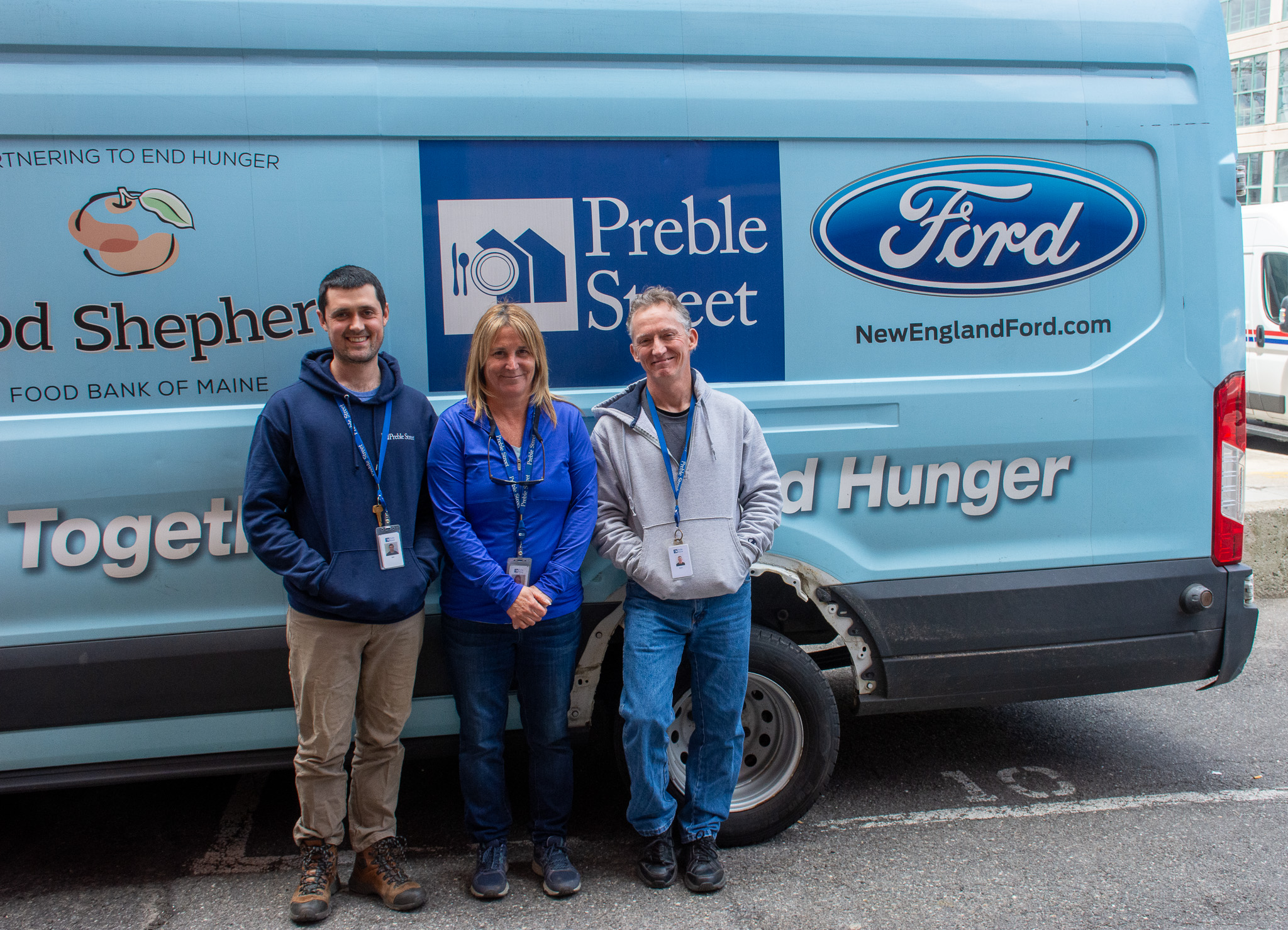The Street Outreach Collaborative (SOC), Preble Street’s mobile outreach team, focuses primarily on people experiencing unsheltered homelessness, with the highest need.
The SOC drives around Portland in a blue, Preble Street branded van, (you’ve probably seen it!) looking to meet basic needs and distribute nutritious meals to people. Basic needs are the foundation for a meaningful relationship with clients, building rapport and trust to then connect them with the larger homeless services system. The SOC uses the inroads they’ve built to connect people to shelter, housing, health services, IDs, clothing, and other critical goods and services to help them work toward their goals.
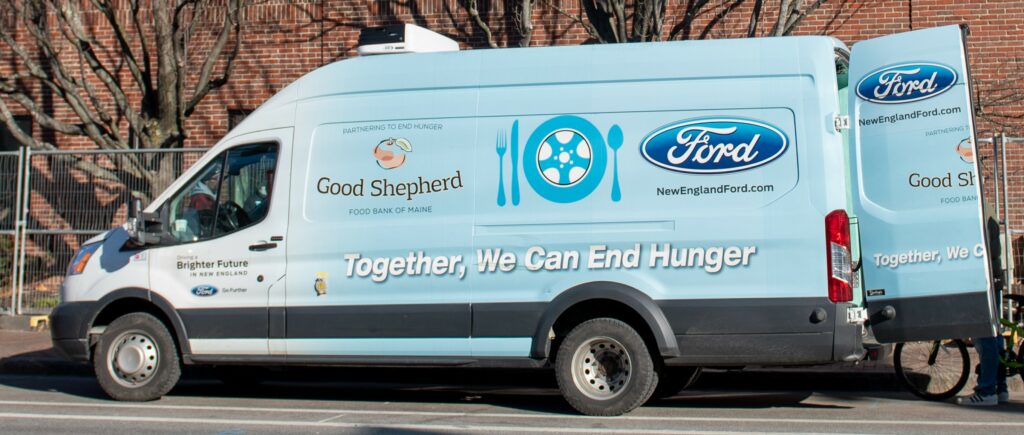
Revisit the 2020 PBS Newshour story about the Street Outreach Collaborative
It often starts with a meal, or a clean pair of socks… a coat on a cold winter day, or a poncho on a rainy day. It can be listening when no one else has. Sowing these seeds of trust, outreach caseworkers engage clients in a continuum of care that, when resources are available, can move people from the street to a shelter to a home and long-term stability.
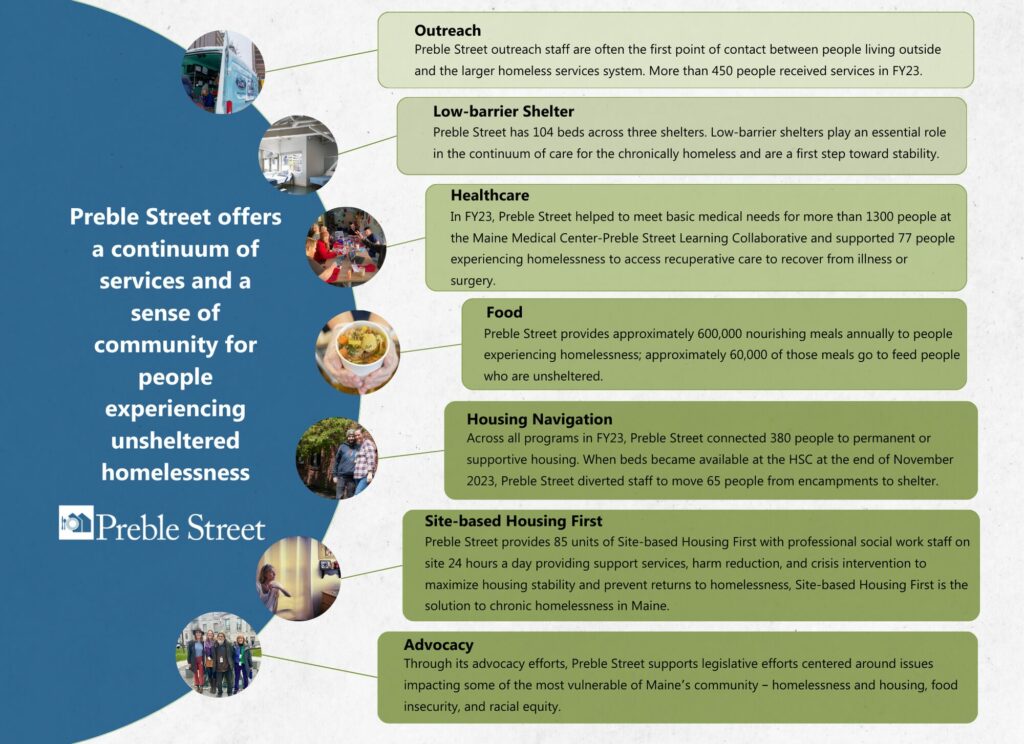
Preble Street’s continuum of services provided to people experiencing unsheltered homelessness, meaning they are sleeping outside or on the street.
Resource availability is one of the SOC’s biggest challenges when trying to move people from the street to shelter or housing. “We need to look up, not down,” says Street Outreach Supervisor Peggy Lynch. Peggy has worked at Preble Street and with people experiencing unsheltered homelessness for close to 20 years. She explains that we need to look upstream to address the rise in homelessness post-pandemic, increasing the availability of shelter beds, affordable housing units, and access to quality mental and medical care.
The City of Portland’s Homeless Services Center (HSC) has crucially increased the number of shelter beds available in the city, with access to some mental and medical health care on-site as well as referrals to other providers. The SOC has formed important partnerships with the City of Portland’s newest outreach team, from the Prevention and Diversion office, working together to transition clients from unsheltered homelessness to the HSC.
Despite these positive steps, the SOC and other outreach teams still face many challenges out of their control. According to a recent statewide study conducted by MaineHousing and other partners, housing demand is currently outpacing availability by roughly 38,500 housing units, varying in size and price, with 84,000 additional units needed by 2030 to match demand. Maine legislators are working to address this crisis — Governor Mills and the 131st legislature allocated $100M from the supplemental budget toward affordable housing production — but there is still a long road ahead to solving this crisis.
Click this link for the 2023 Point-in-time count also conducted by MaineHousing. The Point-in-time count is a survey of sheltered and unsheltered people experiencing homelessness on a single night. It is one of the best tools available for quantifying homelessness.
We need to look up, not down.
Peggy Lynch Street Outreach Supervisor
Peggy identifies the expansion of the detox program at Milestone Recovery from 16 to 30 beds as another important step in the right direction for the city of Portland and for Preble Street clients: “The new expansion of the detox facility at Milestone… this city needs more resources like that.”
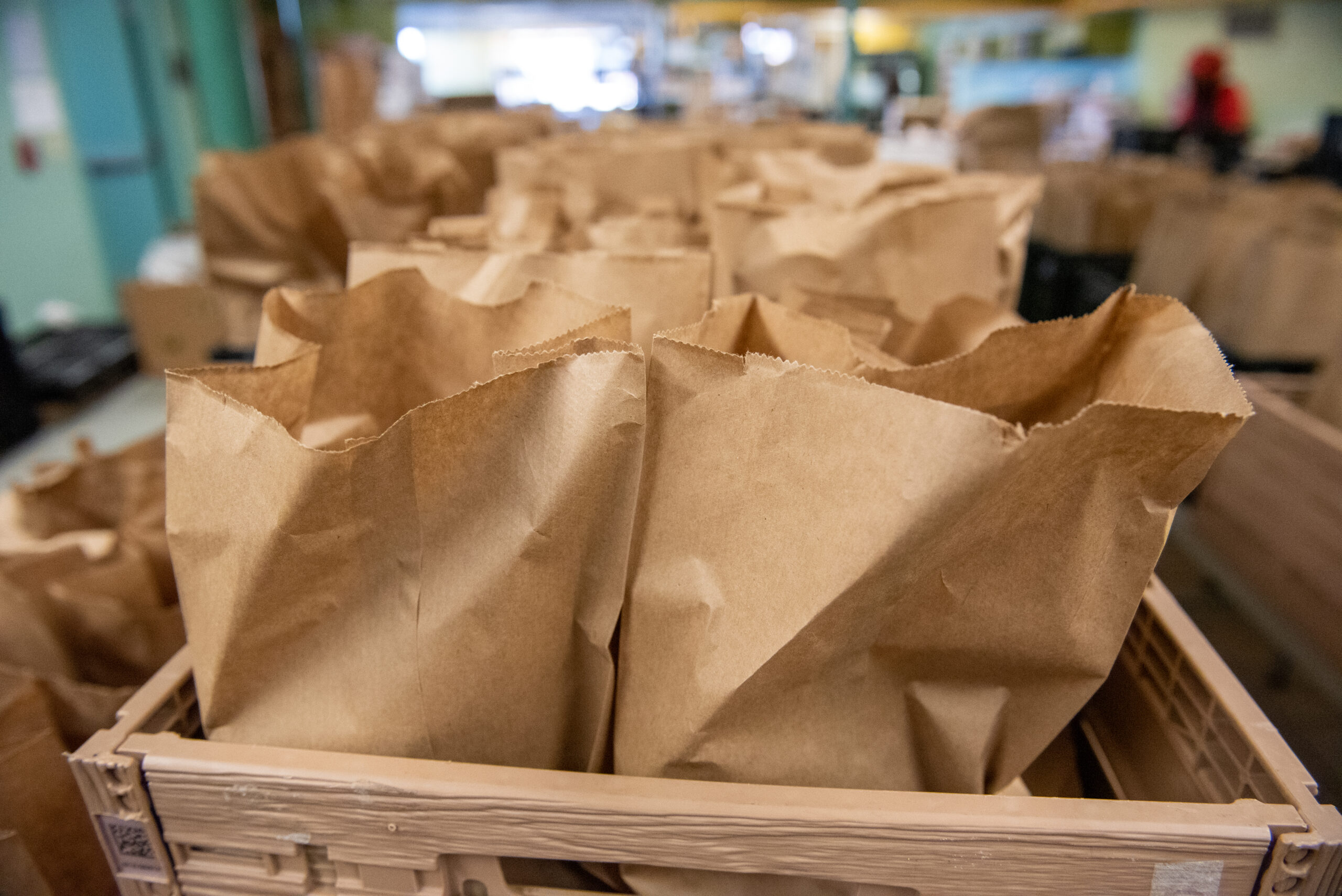
Essential resources, like affordable housing, accessible detox beds, etc., are critical to facilitating the transition from the street to shelter or housing – waitlists and barriers to these resources only worsen the existing homelessness and mental health crises.
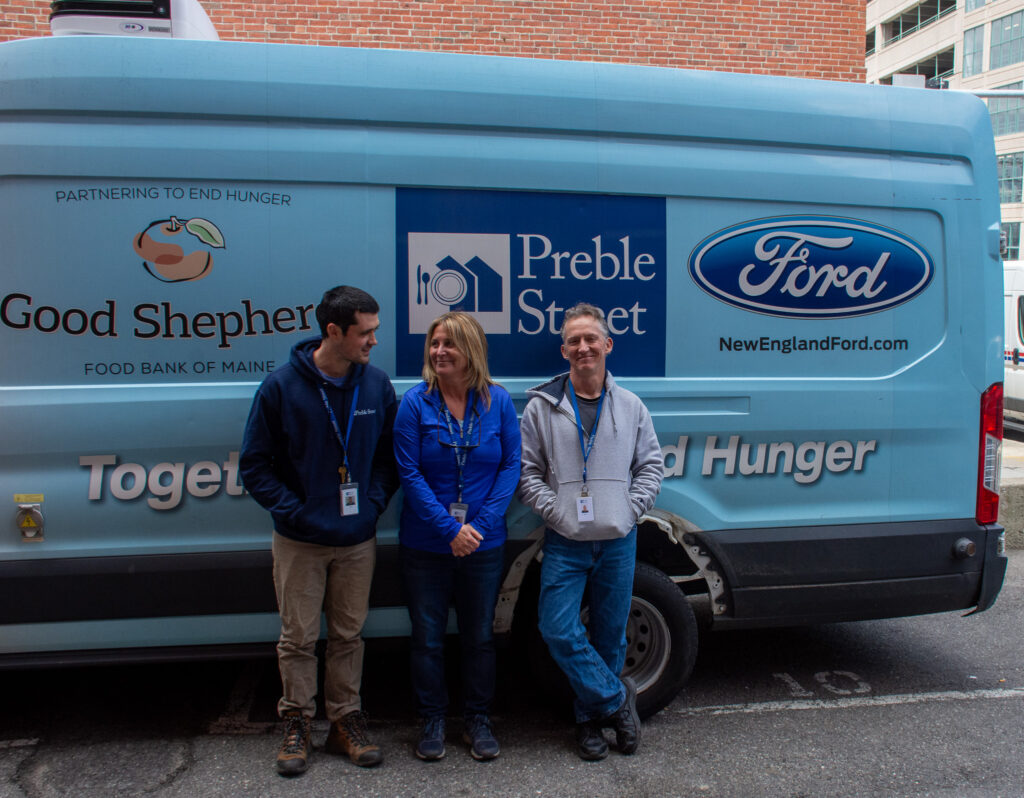
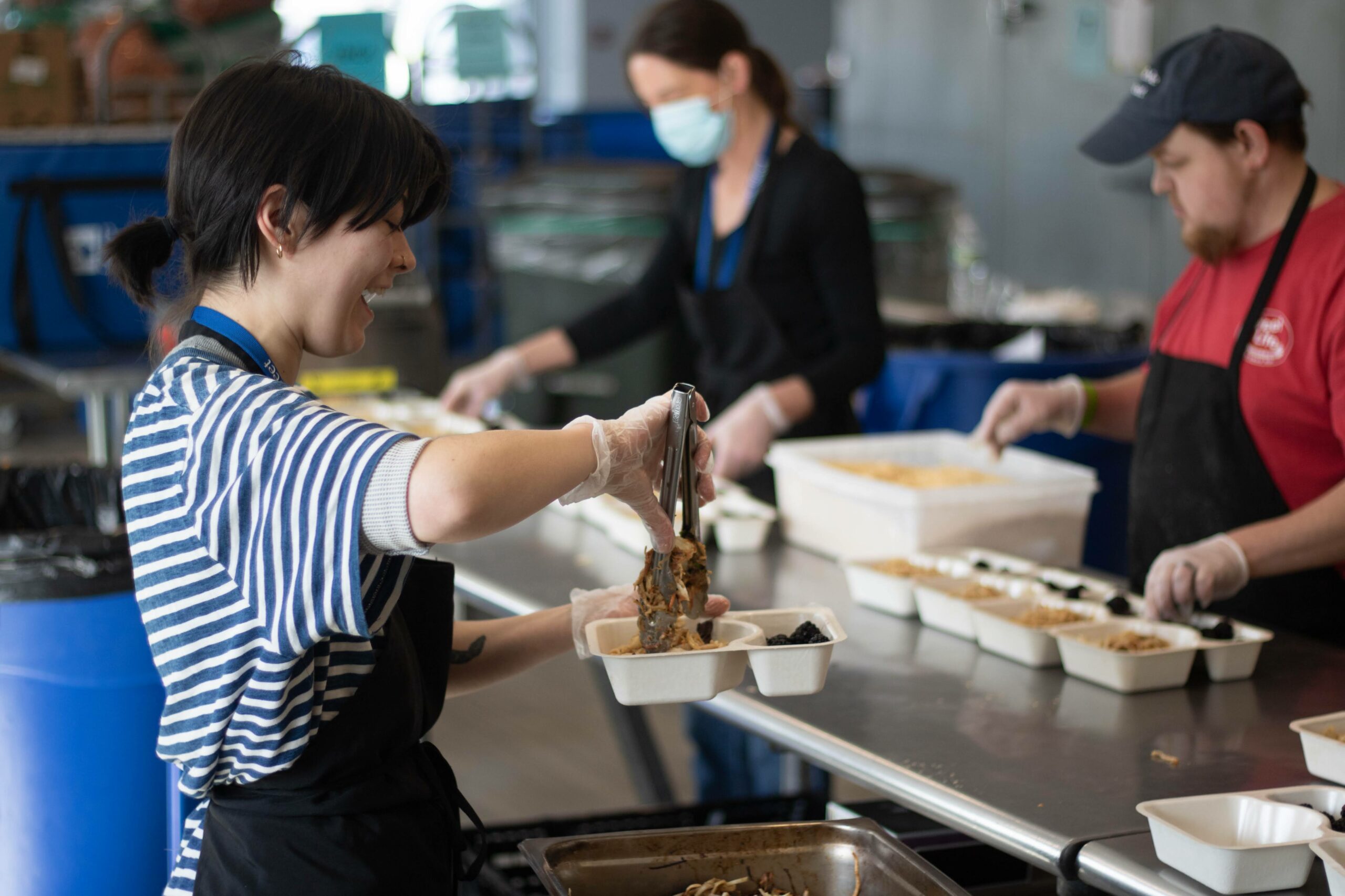
The Street Outreach Collaborative first began during the start of the COVID-19 pandemic, when indoor gathering restrictions were in effect. Preble Street caseworkers couldn’t bring clients into casework offices or offer indoor meals in a traditional congregate soup kitchen setting. Preble Street had to get creative to meet the needs of clients, reimagining the way we provide meals and casework to people experiencing homelessness. Lo and behold, the Street Outreach Collaborative (SOC) was born.
To remain compliant with indoor gathering restrictions, Preble Street began providing services and basic needs on a mobile basis, driving around Portland and meeting with clients in the SOC van. To date in FY24, the SOC has provided casework to 327 different people, with 101 new intakes completed.
Despite the challenges, Street Outreach Collaborative staff show up every day, meeting clients where they’re at — on the street, in the woods, or in encampments — accompanying them on a turbulent and frequently non-linear path to housing or shelter.
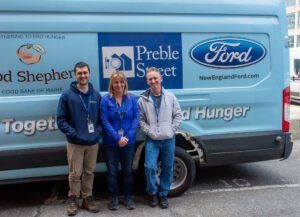
5 years of “social work without walls”
When someone is focused on day-to-day survival, there is little time to attend to long-term goals. Accessing the limited available resources requires sorting through a convoluted web of systems and can be impossible to navigate alone. Every day for the past 5 years, the small but mighty Street Outreach Collaborative (SOC) at Preble Street works
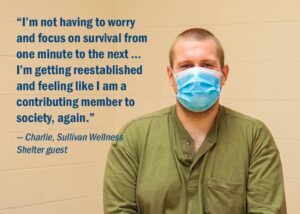
Five Years Later: How Preble Street’s Response to COVID-19 Shaped Its Future
During our 50 years in operation, Preble Street has had to adapt to changing needs and a shifting landscape many times. Never was this truer than in the days, months, and years that followed March 16, 2020. Five years ago this month, while the world was urged to stay home, a question loomed over staff
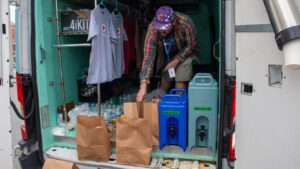
A feeling of home sweet home
[A meal] is so comforting. It’s a feeling of home sweet home. There have been times when I’ve been hungry for so long and struggled for so long that I had a hard time digesting food… I know people that have gone without food so long that having a plate of food in front of
